小学四年级英语下册 MODULE4 unit1(1)名师公开课优质教案 外研版
四年级英语下册Module 4 unit 1教案外研版
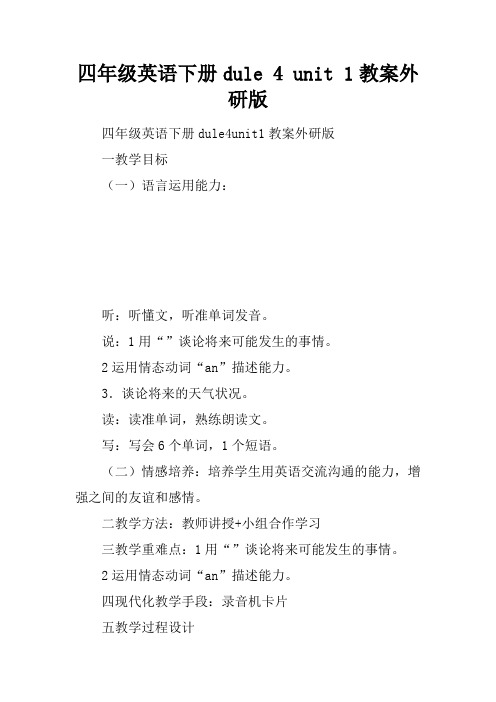
四年级英语下册dule 4 unit 1教案外研版四年级英语下册dule4unit1教案外研版一教学目标(一)语言运用能力:听:听懂文,听准单词发音。
说:1用“”谈论将来可能发生的事情。
2运用情态动词“an”描述能力。
3.谈论将来的天气状况。
读:读准单词,熟练朗读文。
写:写会6个单词,1个短语。
(二)情感培养:培养学生用英语交流沟通的能力,增强之间的友谊和感情。
二教学方法:教师讲授+小组合作学习三教学重难点:1用“”谈论将来可能发生的事情。
2运用情态动词“an”描述能力。
四现代化教学手段:录音机卡片五教学过程设计第一时题:Unit1Rbtsilldeverthing型:新授一(1)热身复习.师生问好。
2.教是带领全班一起做游戏。
教师下指令,学生根据教师的指令做出相应的动作。
T:DasIsa:Run,up,plaftball,plabasetball,platheflute,rabat,aea ae,ashlthes,dher…也可请学生发出指令做动作。
任务呈现与文导入1.教师假装很累,擦擦汗,对学生说:I’vertiredhanhelpus?antherbthelpus?引出文内容。
2.导入新。
(3)文教学。
.教师对机器人进行简单描述。
2.放录音。
同时用笔勾出生词和词组。
3.再放录音。
学生认真听。
并找出问题的答案。
hatanDaing’sRbtd?illrbtsdthehusr?illrbtshelphildrenlearn?illrbtsdherfrhildren?3.讲解学生疑问和问题的答案。
4.学生自读文。
之后同桌交流读文。
(4)任务完成讲解堂活动用书。
二小结1.听懂文,听准单词发音。
2.写会6个单词,1个短语。
三后作业.读准单词。
2.熟读并背诵文。
四板书设计五自我评价学生能听懂文,听准单词发音。
用“”谈论将来可能发生的事情。
运用情态动词“an”描述能力。
并能谈论将来的天气状况。
四年级下册英语教案Module4Unit1Willyoutakeyourkite?外研版(三起)
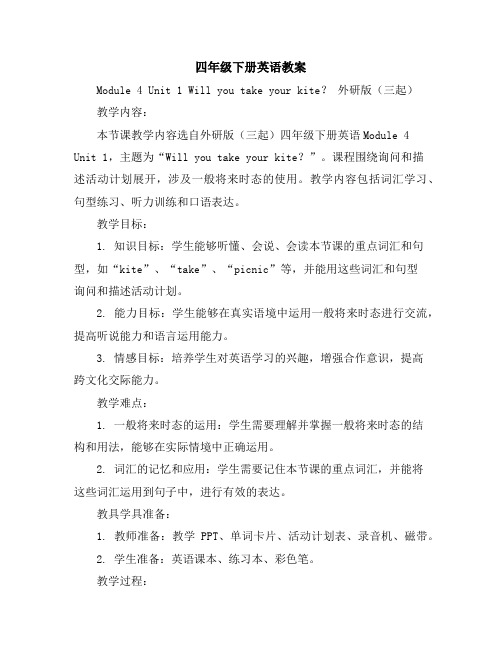
四年级下册英语教案Module 4 Unit 1 Will you take your kite?外研版(三起)教学内容:本节课教学内容选自外研版(三起)四年级下册英语Module 4Unit 1,主题为“Will you take your kite?”。
课程围绕询问和描述活动计划展开,涉及一般将来时态的使用。
教学内容包括词汇学习、句型练习、听力训练和口语表达。
教学目标:1. 知识目标:学生能够听懂、会说、会读本节课的重点词汇和句型,如“kite”、“take”、“picnic”等,并能用这些词汇和句型询问和描述活动计划。
2. 能力目标:学生能够在真实语境中运用一般将来时态进行交流,提高听说能力和语言运用能力。
3. 情感目标:培养学生对英语学习的兴趣,增强合作意识,提高跨文化交际能力。
教学难点:1. 一般将来时态的运用:学生需要理解并掌握一般将来时态的结构和用法,能够在实际情境中正确运用。
2. 词汇的记忆和应用:学生需要记住本节课的重点词汇,并能将这些词汇运用到句子中,进行有效的表达。
教具学具准备:1. 教师准备:教学PPT、单词卡片、活动计划表、录音机、磁带。
2. 学生准备:英语课本、练习本、彩色笔。
教学过程:1. 导入:教师通过展示一张放风筝的图片,引导学生谈论与风筝相关的话题,激发学生的学习兴趣。
2. 新课呈现:教师呈现本节课的重点词汇和句型,通过图片、动作等多种形式帮助学生理解和记忆。
3. 操练:学生通过听录音、跟读、角色扮演等方式进行句型练习,巩固所学知识。
4. 应用:学生分组进行活动,根据实际情况制定活动计划,并运用所学句型进行询问和描述。
板书设计:1. Module 4 Unit 1 Will you take your kite?2. 重点词汇:kite、take、picnic等。
3. 重点句型:Will you take your kite?、I will take my picnic blanket.等。
【优质】小学英语外研版四年级下册M4U1优质公开课教案
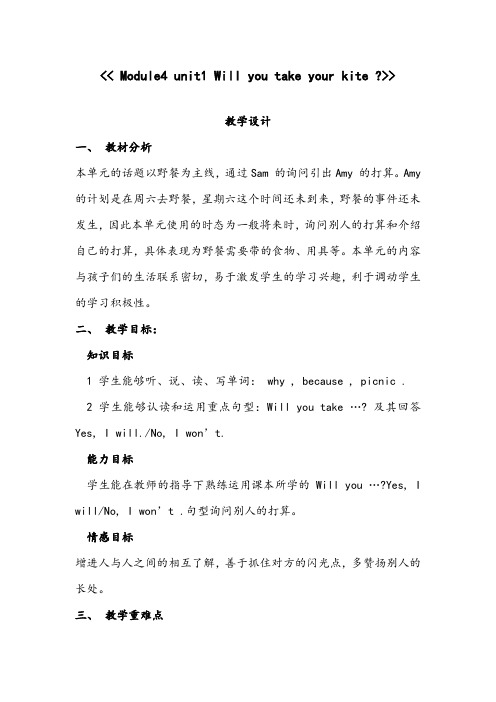
<< Module4 unit1 Will you take your kite ?>>教学设计一、教材分析本单元的话题以野餐为主线,通过Sam 的询问引出Amy 的打算。
Amy 的计划是在周六去野餐,星期六这个时间还未到来,野餐的事件还未发生,因此本单元使用的时态为一般将来时,询问别人的打算和介绍自己的打算,具体表现为野餐需要带的食物、用具等。
本单元的内容与孩子们的生活联系密切,易于激发学生的学习兴趣,利于调动学生的学习积极性。
二、教学目标:知识目标1 学生能够听、说、读、写单词: why , because , picnic .2 学生能够认读和运用重点句型:Will you take …? 及其回答Yes, I will./No, I won’t.能力目标学生能在教师的指导下熟练运用课本所学的Will you …?Yes, I will/No, I won’t .句型询问别人的打算。
情感目标增进人与人之间的相互了解,善于抓住对方的闪光点,多赞扬别人的长处。
三、教学重难点重点:培养学生在特定语境中领悟和使用语言的能力,掌握句型Will you take …?及其回答Yes, I will ./No, I won’t .难点:一般将来时的理解和运用,能使用Will you take …? Yes, I will ./No, I won’t .四、教学方法小组合作学习、多媒体辅助教学五、教具准备PPT 点读笔六、教学过程Step 1 Warming-up :1、Greetings:T:Good morning ,boys and girls.Ss:Good morning,teacher.T:How are you ?Ss:I’m fine ,thank you.And you ?T: I’m fine ,too.Thank you.2、Say a song : Row , row, row your boat 教师播放Flash ,师生齐唱歌曲并做出相应的动作。
新外研版英语四年级下Module4 U1教案(公开课)

Unit 1 Will you take your kite? 【教学内容分析】本课是义务教育教科书(外研版)(三年级起)四年级下册第四模块第一单元的内容。
本单元的话题内容是通过Sam和Amy谈论去野餐要带的物品,使学生学习使用句型Will you take your kite? Yes, I will./ No, I won’t.询问和回答。
为了激发学生兴趣和更好地感知习得语言,运用信息化教学手段和数字化教学资源,并与传统教学有效融合。
【教学目标】知识目标:1.使85%-95%的学生能听懂并认读单词picnic, take, why, because;2. 使80%的学生会使用句型Will you take your kite? Yes, I will./ No, I won’t. 进行询问和回答。
能力目标:1.使95%的学生能用正确的语音语调朗读课文;2.使90%的学生能准确运用本课的目标句型Will you take your kite? Yes, I will./No, I won’t. 来询问和回答。
情感态度:使学生学会与他人合作,并且会制定计划。
【学情分析】1.一般特征:四年级小学生对英语学习依然有着强烈的好奇心和浓厚的兴趣,他们愿意用英语交流,喜欢模仿,有很好的记忆力。
2.初始能力:学生已经初步学习了will的用法,并且已经会用will描述自己的计划。
3.信息素养:学生基本具备一定的信息技术能力,能够根据学习需要借助信息技术完成相应的活动。
【重点难点】重点:1.使学生能准确认读本课的新单词(picnic, take, why, because等)2.使学生能熟练掌握本课的目标句型:Will you take your kite? Yes, I will./ No, I won’t.难点:使学生能在日常生活中熟练运用本课的目标句型询问和回答。
(包括将要带的物品、将要做的事情等。
)【教具学具准备】交互式电子白板、课件、书、练笔资料、点读笔、光盘。
四年级下册英语教学设计-Module4 Unit1|外研社(三起)
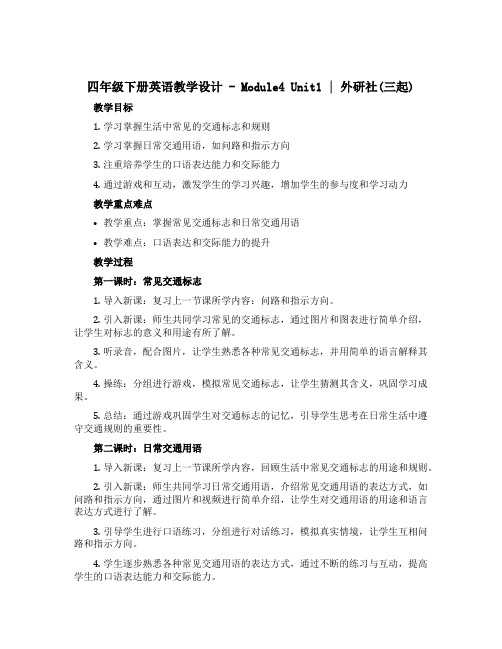
四年级下册英语教学设计 - Module4 Unit1 | 外研社(三起)教学目标1.学习掌握生活中常见的交通标志和规则2.学习掌握日常交通用语,如问路和指示方向3.注重培养学生的口语表达能力和交际能力4.通过游戏和互动,激发学生的学习兴趣,增加学生的参与度和学习动力教学重点难点•教学重点:掌握常见交通标志和日常交通用语•教学难点:口语表达和交际能力的提升教学过程第一课时:常见交通标志1.导入新课:复习上一节课所学内容:问路和指示方向。
2.引入新课:师生共同学习常见的交通标志,通过图片和图表进行简单介绍,让学生对标志的意义和用途有所了解。
3.听录音,配合图片,让学生熟悉各种常见交通标志,并用简单的语言解释其含义。
4.操练:分组进行游戏,模拟常见交通标志,让学生猜测其含义,巩固学习成果。
5.总结:通过游戏巩固学生对交通标志的记忆,引导学生思考在日常生活中遵守交通规则的重要性。
第二课时:日常交通用语1.导入新课:复习上一节课所学内容,回顾生活中常见交通标志的用途和规则。
2.引入新课:师生共同学习日常交通用语,介绍常见交通用语的表达方式,如问路和指示方向,通过图片和视频进行简单介绍,让学生对交通用语的用途和语言表达方式进行了解。
3.引导学生进行口语练习,分组进行对话练习,模拟真实情境,让学生互相问路和指示方向。
4.学生逐步熟悉各种常见交通用语的表达方式,通过不断的练习与互动,提高学生的口语表达能力和交际能力。
5.总结:通过游戏巩固学习成果,让学生逐渐掌握日常交通用语,并且了解其中的交际规范。
教学评价1.通过对学生的回答问题、表达能力及互动情况的考察,评价学生的学习成果及教学效果。
2.通过布置作业考察学生的记忆和对常见交通标志的理解和应用能力。
教学心得该教学设计注重以游戏为主线,以交际能力和口语表达为重点,通过对常见交通标志和日常交通用语的掌握,培养学生的交通安全意识和应变能力,提高学生的英语水平和实际应用能力。
四年级英语下册教案-Module 4 Unit 1 (1)-外研版(三起)
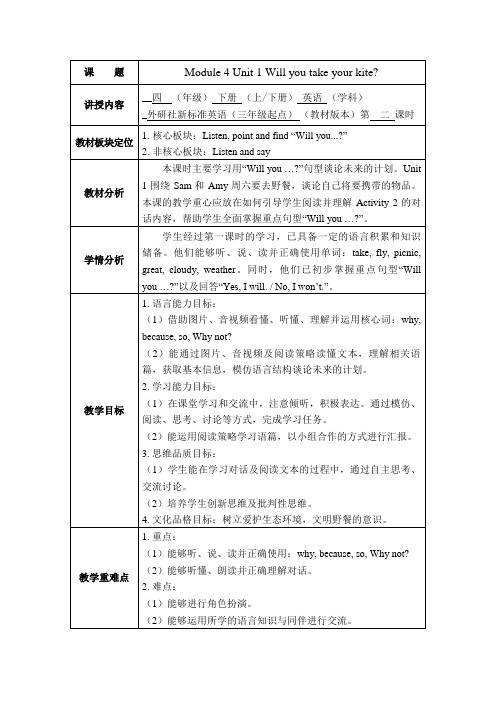
Step 6 Self-assessment (3mins)语言能力I can read the wordsand text.学习能力I can use sentences tocommunicate.思维品质I can make my ownpicnic plan.文化品格I can be civilized on apicnic.促进学生自我反思,正确分析自己对本课知识的掌握情况,认清不足,努力提高自身的学习能力。
Your point:_________Suggestions:If you got 1--8 , try to get help fromteacher and classmates.If you got 9-12 , you are excellentand please keep working hard.Step 7 Homework (1mins) 1.Read more picture books about thepicnic and share with your friends.2.Make a weekend plan with your family.3.Share your weekend plan.巩固新知,提升综合语言运用能力,并让学生学会合作与分享。
板书设计教学反思本课时是外研版(三起)四年级下册Module 4 Unit 1 Will you take your kite?的第二课时,本课时的教学重点是让学生能够看懂、听懂、理解并运用核心词:why, because, so, Why not?以及能够通过图片、音视频及阅读策略读懂文本,理解相关语篇。
本课时设计了许多适合四年级学生参与的教学活动,以激发学生英语学习的兴趣,轻松掌握新知。
但本课时的教学设计仅仅是一个大体思路,其中有些活动并不一定能在教学中收到最佳效果,需要教师在教学实践中不断探索,并加以改进。
四年级下册英语教案-M4Unit1Willyoutakeyourkite(外研版)

四年级下册英语教案M4 Unit 1 Will you take your kite(外研版)教学内容本单元主要围绕“将来时态”和“询问他人计划”的交际功能展开。
教学内容包括四年级下册英语课本M4 Unit 1的词汇、句型、听力练习和口语表达。
学生将通过学习,能够运用将来时态询问和表达自己的周末计划,并能够理解他人的计划。
教学目标1. 知识目标:学生能够听懂、会说、会读本单元的生词和短语,如“kite”,“take”,“go”等。
2. 能力目标:学生能够运用将来时态询问他人的计划,并能用所学句型进行回答。
3. 情感目标:培养学生对英语学习的兴趣,增强学生合作学习的意识。
教学难点1. 语法难点:将来时态的使用,特别是“will”结构。
2. 表达难点:学生能够自然、流畅地运用所学句型进行实际交流。
教具学具准备1. 教具:多媒体教学设备,PPT课件,录音机,单词卡片。
2. 学具:英语课本,练习本,彩色笔。
教学过程1. 热身活动:通过播放英语歌曲,营造英语学习氛围,激发学生学习兴趣。
2. 新课导入:通过展示与单元主题相关的图片,引导学生预测本节课的内容。
3. 词汇学习:利用单词卡片和PPT,教授本单元的重点词汇。
4. 句型练习:通过角色扮演和小组活动,让学生练习将来时态的问答句型。
5. 听力训练:播放录音,让学生听懂并获取关键信息。
6. 口语表达:设计情景对话,让学生在实际语境中运用所学知识。
板书设计板书将围绕本单元的核心词汇和句型进行设计,采用图表和关键词的形式,直观展示教学内容,便于学生理解和记忆。
作业设计1. 书面作业:完成练习册上的相关练习。
2. 口头作业:与家长或同伴进行情景对话练习。
3. 扩展作业:收集有关周末活动的图片或小文章,下节课分享。
课后反思通过本教案的实施,期望学生能够在愉快的氛围中学习英语,提高他们的英语实际运用能力,并增强他们的团队合作意识。
教学难点语法难点:将来时态的使用,特别是“will”结构。
外研版四年级英语下册《Module 4 Unit 1》精品教案教学设计优秀公开课
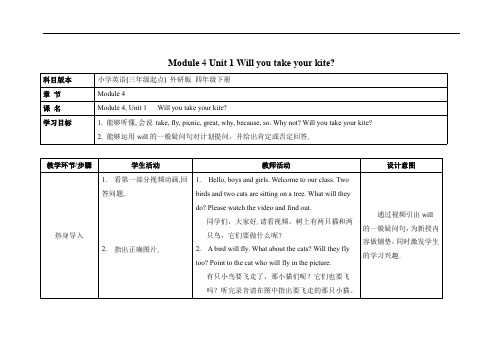
Module4Unit1Will you take your kite?教学环节/步骤学生活动教师活动设计意图热身导入1.看第一部分视频动画,回答问题。2.指出正确图片。1.Hello,boys and girls.Welcome to our class.Twobirds and two cats are sitting on a tree.What will theydo?Please watch the video and find out.同学们,大家好。请看视频,树上有两只猫和两只鸟,它们要做什么呢?2.A bird will fly.What about the cats?Will they flytoo?Point to the cat who will fly in the picture.有只小鸟要飞走了,那小猫们呢?它们也要飞吗?听完录音请在图中指出要飞走的那只小猫。
通过视频引出will的一般疑问句,为新授内容做铺垫,同时激发学生的学习兴趣。科目版本小学英语(三年级起点)外研版四年级下册章节Module4课名Module4,Unit1Will you take your kite?学习目标 1.能够听懂、会说take,fly,picnic,great,why,because,so.Why not?Will you take your kite?2.能够运用will的一般疑问句对计划提问,并给出肯定或否定回答。3.跟随动画朗读全文。
3.You’re right.The yellow cat will fly too.But itfalls from the tree.So the white cat won’t fly.Pleasewatch the video again and read after it.你猜对了。
黄色小猫也要飞走,但是它从树上掉下来了。
所以白色小猫决定不要飞了。
四年级下册英语教案-Module4 Unit 1 Dad played the erhu 外研版
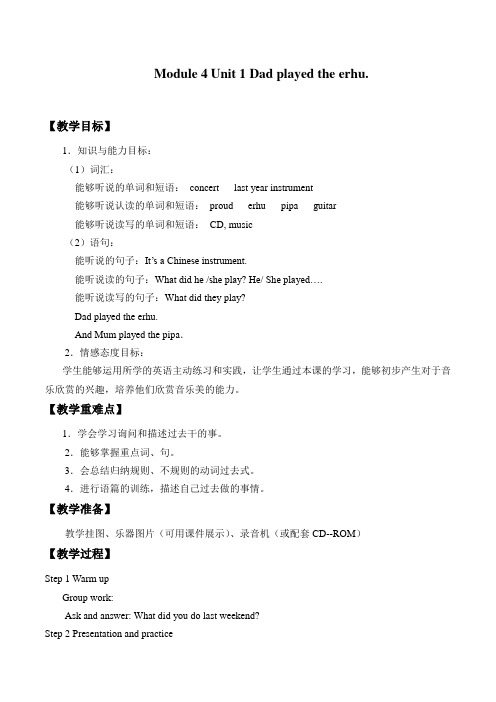
Module 4 Unit 1 Dad played the erhu.【教学目标】1.知识与能力目标:(1)词汇:能够听说的单词和短语:concert last year instrument能够听说认读的单词和短语:proud erhu pipa guitar能够听说读写的单词和短语:CD, music(2)语句:能听说的句子:It’s a Chinese instrument.能听说读的句子:What did he /she play? He/ She played….能听说读写的句子:What did they play?Dad played the erhu.And Mum played the pipa.2.情感态度目标:学生能够运用所学的英语主动练习和实践,让学生通过本课的学习,能够初步产生对于音乐欣赏的兴趣,培养他们欣赏音乐美的能力。
【教学重难点】1.学会学习询问和描述过去干的事。
2.能够掌握重点词、句。
3.会总结归纳规则、不规则的动词过去式。
4.进行语篇的训练,描述自己过去做的事情。
【教学准备】教学挂图、乐器图片(可用课件展示)、录音机(或配套CD--ROM)【教学过程】Step 1 Warm upGroup work:Ask and answer: What did you do last weekend?Step 2 Presentation and practice1.Ask the teacher: What did you do last weekend?T: I listened to music.I like to listen to music.I like Chinese music like this. (播放一段音乐)Do you know him?吕思清played the music.(一张吕思清的演出图片)What can you ask?What did he play?(板书、教读)He played the violin. (板书、教读)2.What did she play? (图片)She played the guitar.3.Guess: It’s a Chinese instrument. It looks like a violin.I spell the word just like pinyin.What is it? (图片)Teach: erhu instrument It looks like a violin.4.What did she play? (图片)She played the pipa.Teach: pipa It looks like a guitar.5.Look at the picture. (可采用女子十二乐坊的图片)Pair work: Ask and answer.Who are they?What did they play?T: Where did the play?Teach: concert6.Listen and answer:What did Dad play?What did Mum play?Does Amy like this music?7.Listen, point and repeat.Step 3 Consolidation and extension1.Do the exercises on the activity book.Match the questions and answer.Listen and number.2.Practice on the book: (注意the 的用法)3.Remember game: What did they play?Step 4 Summary1.让学生自己总结本节课的知识点,教师应该强调一下有关play 加球类游戏、乐器的不同。
(三起点)外研版四年级英语下册《Module4_Unit1_名师教案【山东威海】》

M4 U1 Will you take your kite? 教学设计教学目标:(一)知识目标:1) 四会单词fly, take, picnic, why, because。
2) 学会运用句型Will you take …? 询问他人的计划及做出肯定与否定回答。
(二)能力目标:能用所学句型:Will you take …? Yes, I will. / No, I won’t.谈论并制定计划。
(三)情感目标:培养学生的合作交流能力,教育学生做一个量力而行,做事有计划,认真的人。
教学重难点:(一)重点:灵活使用Will you take …? Yes, I will. / No, I won’t.询问他人的计划及做出肯定与否定回答。
(二)难点:灵活掌握运用词汇take, why, because教学方法:直观教学法,任务教学法,情景教学法,小组合作交流法教学过程:一、热身活动First let’s sing a song. 学生齐唱《Monday, Tuesday…》T: Do you like Saturday? (Yes.) I like Saturday too. And I will fly a kite on Saturday. What will you do on Saturday? (找几位学生回答)T: Will you fly? (No.) 【教学新单词fly】T: Will a bird fly? (Yes.) Will a cat fly? (No.)But today there is a yellow cat. It will fly. Do you want to see the flying cat? (Yes.) 二、新授(一)学习活动一Let’s have a look and answer the questions.【播放课文1】T: Will the yellow cat fly? (Yes.) And then, it … bong~~~Will the white cat fly? (No, it won’t.)So please remember “Before you do something, make sure you can do it. You should have your own ideas, i nstead of following others’ saying. Just like the white cat. OK? (二)学习活动二1. 一进文本And I think before we do anything, we should make a plan first. For example, on Saturday I’m going to fly a kite, what are A my and Sam going to do? Let’s watc h the video and choose the answer: We are going to have a ________ on Saturday.【播放课文2】选择答案【教学picnic — have a picnic】领读,看图片做句子。
四年级英语下册MODULE4unit1(1)教案外研版
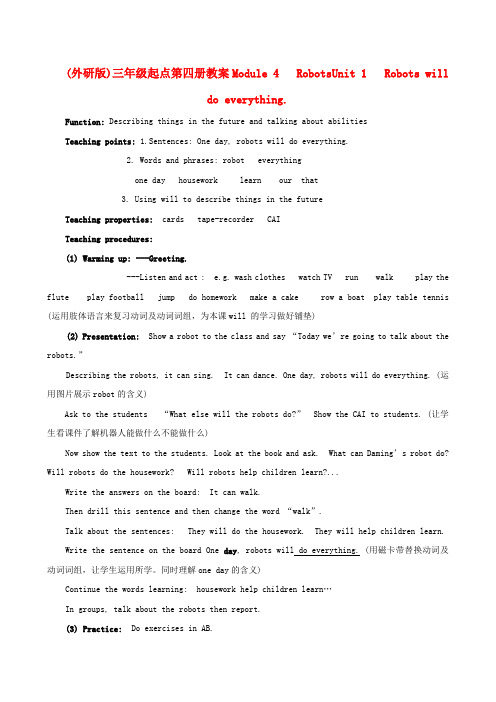
(外研版)三年级起点第四册教案Module 4 RobotsUnit 1 Robots willdo everything.Function: Describing things in the future and talking about abilitiesTeaching points: 1.Sentences: One day, robots will do everything.2. Words and phrases: robot everythingone day housework learn our that3. Using will to describe things in the futureTeaching properties: cards tape-recorder CAITeaching procedures:(1) Warming up: ---Greeting.---Listen and act : e.g. wash clothes watch TV run walk play the flute play football jump do homework make a cake row a boat play table tennis (运用肢体语言来复习动词及动词词组,为本课will 的学习做好铺垫)(2) Presentation: Show a robot to the class and say “Today we’re going to talk about the r obots.”Describing the robots, it can sing. It can dance. One day, robots will do everything. (运用图片展示robot的含义)Ask to the students “What else will the robots do?” Show the CAI to students. (让学生看课件了解机器人能做什么不能做什么)Now show the text to the students. Look at the book and ask. What can Daming’s robot do? Will robots do the housework? Will robots help children learn?...Write the answers on the board: It can walk.Then drill this sentence and then change the wor d “walk”.Talk about the sentences: They will do the housework. They will help children learn.Write the sentence on the board One day, robots will do everything. (用磁卡带替换动词及动词词组,让学生运用所学。
四年级下学期外研英语Module 4教案 Unit 1-1

版本外研版学科英语册数四年级(下册)单元Module 4 Unit 1 课题Dad played the erhu.教学目标知识与能力目标:(1)词汇:能够听说的单词和短语:concert last year instrument 能够听说认读的单词和短语:proud erhu pipa guitar能够听说读写的单词和短语:CD, music(2)语句:能听说的句子:It’s a Chinese instru ment.能听说读的句子:What did he /she play? He/ She played.能听说读写的句子:What did they play? Dad played the erhu. And Mum played the pipa.德育教学目标学生能够运用所学的英语主动练习和实践,让学生通过本课的学习,能够初步产生对于音乐欣赏的兴趣,培养他们欣赏音乐美的能力。
教学重点 1. 学会询问和描述过去干的事。
2. 能够掌握重点词句。
教学难点1. 会总结归纳规则、不规则的动词过去式。
2. 进行语篇的训练,描述自己过去做的事情教学准备课件卡片教学板块教与学预设(师生活动)教学重构(修改意见)前置性作业一、自学本课单词,熟读,并会拼写。
二、搜集查询各种乐器的英文名称,课堂展示给大家,会乐器的同学可课堂展示给学生。
三、熟读课文。
教学过程课前3分钟内容:教师播放几段乐器的声音,让学生以小组竞赛的形式猜测演奏的乐器,给小组加分。
Ⅰ: Warming-up and Revision1. Greetings.2. Sing the song “Hickory”.3. Free talkTalk about some instruments or some sports we can lay.Ⅱ: Leading-in1. Teacher shows the picture and describes the picture.2. Write the title on the blackboard.Ⅲ: Listening & Reading Activities.1. Listen to recorder.2. Listen and read after the recorder.3. Learn new words.4. Teach the sentence pattern.Ⅳ: Further development1. Action.2. Practice Activity3.Ⅴ: HomeworkListen and read unit 1 three times, try to act.板书设计Module 4 Unit 1 Dad played the erhu.What did they play?Dad played the erhu.Mum played the pipa。
外研英语四年级下优质教案:Module4 Unit 1 Will you take your kite(1)
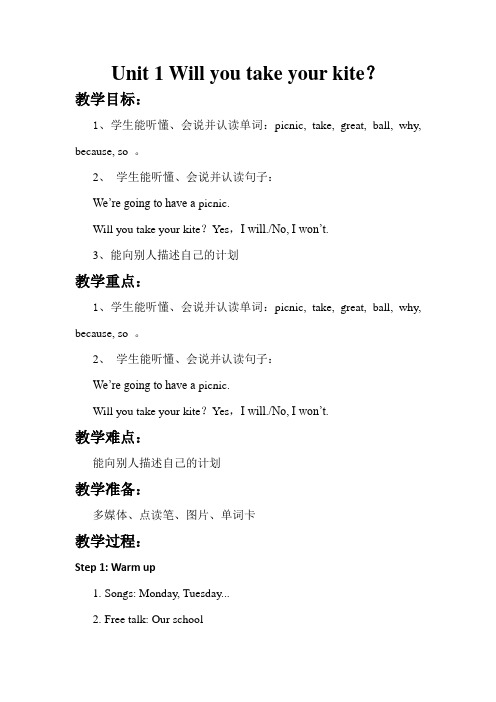
Unit 1 Will you take your kite?教学目标:1、学生能听懂、会说并认读单词:picnic, take, great, ball, why, because, so 。
2、学生能听懂、会说并认读句子:We’re going to have a picnic.Will you take your kite?Yes,I will./No, I won’t.3、能向别人描述自己的计划教学重点:1、学生能听懂、会说并认读单词:picnic, take, great, ball, why, because, so 。
2、学生能听懂、会说并认读句子:We’re going to have a picnic.Will you take your kite?Yes,I will./No, I won’t.教学难点:能向别人描述自己的计划教学准备:多媒体、点读笔、图片、单词卡教学过程:Step 1: Warm up1. Songs: Monday, Tuesday...2. Free talk: Our schoolStep 2: Presentation1. Listen and point.T: It’s a ball. (Show the ball) I’m going to play ball. Will you play with me?S2: Yes, I will.T: I’m going to go to Hainan. Will you take a ball? (同时板书)S2: No, I won’t.2. Teacher shows the cards about the new words. Students follow the teacher .The students read one by one.S1: Will you go to park tomorrow?S2: Yes, I will.S3: Tomorrow you’re going to have a Music lesson.S4: No, I won’t.Step 3: Teacher-student interaction1. Two students play a game .They choose one food or one object and do the action.S1: Will you take some noodles?S2: No, I won’t.S1: Will you take a cake?S2: Yes, I will.2. Four students look some pictures and tale about.S1: We’re going to go to Hainan tomorrow. I will take my coat andmy hat. Will you take your swimsuit?S2: No, I won’t. I’ll take my coat, too. Will you take your gloves?S3: Yes, I Will.S4: I will take my swimsuit.评出最佳一组给予奖励。
四年级下册英语教案-Module4Unit1-外研社(三起)

四年级下册英语教案Module4 Unit1外研社(三起)教学内容:本单元为外研社《新标准英语》(三起)四年级下册第四模块第一单元。
教学内容主要围绕家庭成员的描述,重点词汇包括father, mother, brother, sister, grandmother, grandfather等。
句型结构以"This is my "为主,用于介绍家庭成员。
教学目标:1. 学生能够听懂、会说、会读本单元的重点词汇。
2. 学生能够运用句型"This is my "介绍自己的家庭成员。
3. 培养学生的英语听说能力,提高其英语学习的兴趣。
4. 增强学生对家庭的爱和责任感。
教学难点:1. 正确发音并记忆新词汇。
2. 灵活运用句型介绍家庭成员。
教具学具准备:1. 家庭成员的图片或实物。
2. 录音机及教材录音带。
3. 黑板和粉笔。
4. 学生练习本和笔。
教学过程:1. 导入:通过播放家庭成员的图片,引导学生复习已学过的相关词汇。
2. 新课呈现:教师展示新词汇,并通过实物或图片辅助教学,让学生跟读并模仿。
3. 句型练习:教师引导学生使用句型"This is my "介绍家庭成员,并进行角色扮演。
4. 听力训练:播放教材录音,让学生听并跟读,加强听力理解能力。
5. 小组活动:学生分组,用所学词汇和句型介绍自己的家庭成员。
板书设计:Title: Module4 Unit1Key Vocabulary: father, mother, brother, sister, grandmother, grandfatherSentence Pattern: "This is my "Family Member Pictures作业设计:1. 抄写并记忆新学的家庭成员词汇。
2. 用英语写一段介绍自己家庭成员的短文。
3. 家长辅助,用英语进行家庭成员的角色扮演。
人教版小学英语四年级下册Unit4Lesson1公布课教学设计
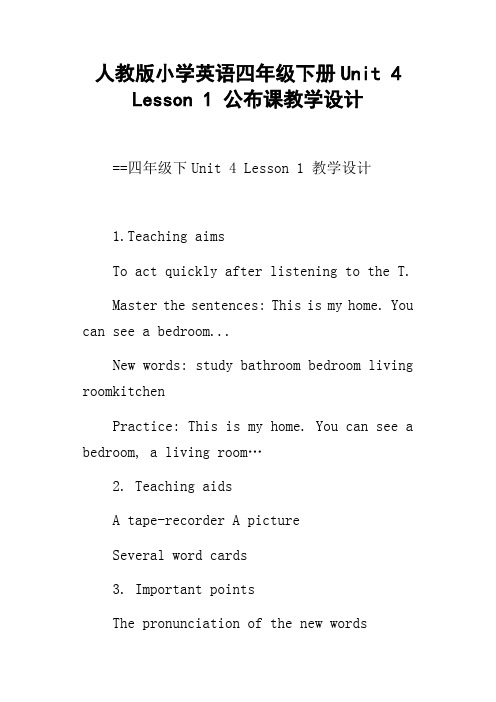
人教版小学英语四年级下册Unit 4 Lesson 1 公布课教学设计==四年级下Unit 4 Lesson 1 教学设计1.Teaching aimsTo act quickly after listening to the T.Master the sentences: This is my home. You can see a bedroom...New words: study bathroom bedroom living roomkitchenPractice: This is my home. You can see a bedroom, a living room…2. Teaching aidsA tape-recorder A pictureSeveral word cards3. Important pointsThe pronunciation of the new words4.Teaching steps1) GreetingsDo some oral work and sing a song.2) New contentsAt first, the teacher shows Amy’s house using the computer. “What can you see in the picture?”“I can see a study.”“I can see a bedroom.”…….5.Homework WorkTo say the sentences smoothlyListen to the tape and recite the new words.6.Teaching notes==四年级下Unit 4 Lesson 1 教学设计1.Teaching aimsTo act quickly after listening to the T.Master the sentences: This is my home. You can see a bedroom...New words: study bathroom bedroom living roomkitchenPractice: This is my home. You can see a bedroom, a living room…2. Teaching aidsA tape-recorder A pictureSeveral word cards3. Important pointsThe pronunciation of the new words4.Teaching steps1) GreetingsDo some oral work and sing a song.2) New contentsAt first, the teacher shows Amy’s house using the computer. “What can you see in the picture?”“I can see a study.”“I can see a bedroom.”…….5.Homework WorkTo say the sentences smoothlyListen to the tape and recite the new words.6.Teaching notes==四年级下Unit 4 Lesson 1 教学设计1.Teaching aimsTo act quickly after listening to the T.Master the sentences: This is my home. You can see a bedroom...New words: study bathroom bedroom living roomkitchenPractice: This is my home. You can see a bedroom, a living room…2. Teaching aidsA tape-recorder A pictureSeveral word cards3. Important pointsThe pronunciation of the new words4.Teaching steps1) GreetingsDo some oral work and sing a song.2) New contentsAt first, the teacher shows Amy’s house using the computer. “What can you see in the picture?”“I can see a study.”“I can see a bedroom.”…….5.Homework WorkTo say the sentences smoothlyListen to the tape and recite the new words.6.Teaching notes。
四年级下册英语教案Module 4Unit 1 Will you take your kite∣外研版(三起)
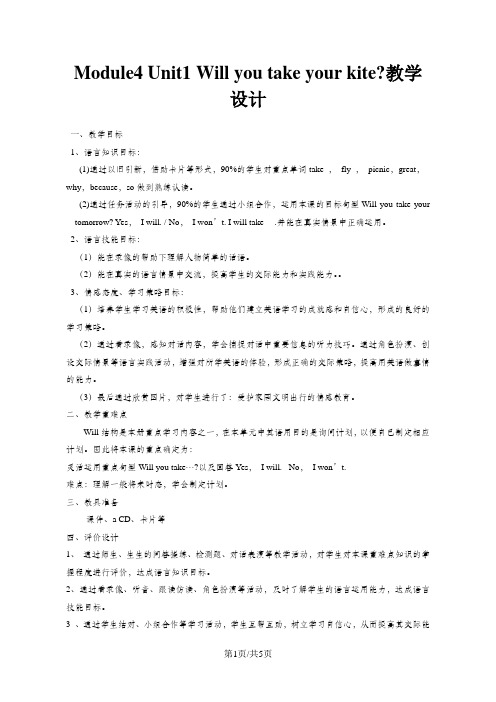
Module4 Unit1 Will you take your kite?教学设计一、教学目标1、语言知识目标:(1)通过以旧引新,借助卡片等形式,90%的学生对重点单词take ,fly ,picnic,great,why,because,so做到熟练认读。
(2)通过任务活动的引导,90%的学生通过小组合作,运用本课的目标句型Will you take your ---tomorrow? Yes,I will. / No,I won’t. I will take ---.并能在真实情景中正确运用。
2、语言技能目标:(1)能在录像的帮助下理解人物简单的话语。
(2)能在真实的语言情景中交流,提高学生的交际能力和实践能力。
3、情感态度、学习策略目标:(1)培养学生学习英语的积极性,帮助他们建立英语学习的成就感和自信心,形成的良好的学习策略。
(2)通过看录像,感知对话内容,学会捕捉对话中重要信息的听力技巧。
通过角色扮演、创设交际情景等语言实践活动,增强对所学英语的体验,形成正确的交际策略,提高用英语做事情的能力。
(3)最后通过欣赏图片,对学生进行了:爱护家园文明出行的情感教育。
二、教学重难点Will结构是本册重点学习内容之一,在本单元中其语用目的是询问计划,以便自己制定相应计划。
因此将本课的重点确定为:灵活运用重点句型Will you take…?以及回答Yes,I will. No,I won’t.难点:理解一般将来时态,学会制定计划。
三、教具准备课件、a CD、卡片等四、评价设计1、通过师生、生生的问答操练、检测题、对话表演等教学活动,对学生对本课重难点知识的掌握程度进行评价,达成语言知识目标。
2、通过看录像、听音、跟读仿读、角色扮演等活动,及时了解学生的语言运用能力,达成语言技能目标。
3 、通过学生结对、小组合作等学习活动,学生互帮互助,树立学习自信心,从而提高其交际能力及实践能力,达成情感态度、学习策略目标。
外研版四年级下册《Module 4 Unit 1》教学设计

Module 4 Unit1 Will you take your kite?教学目标:1.知识目标:使学生能听说、认读单词“picnic, great, take, ball, why, because, so, Saturday ,Friday”,并学会用“We’re going to have a picnic.”以及“Will you take your kite?”–“Yes, I will./No, I won’t.”的语言结构。
2.技能目标:制定并谈论计划。
3.情感态度目标:通过引导学生参与游戏、表演对话等丰富多彩的教学活动,营造轻松愉快的教学氛围,培养学生的学习兴趣和热爱大自然的情怀。
教学重点:学会用“Will you take your kite?”–“Yes, I will./No, I won’t.”的语言结构来回答相关问题。
教学难点:对将来时的初步掌握以及新单词相关语句在实际生活中的应用确立重点与难点的依据:根据新课标的要求,学生的实际英语水平及英语教学的目的和作用。
教学准备:多媒体课件。
教学过程:Step1: Warm up1.Sing an English song.2.GreetingsT: OK, class begin. Good morning, Boys and girl.Ss: Good morning, Miss Yang.T: How are you today?Ss: I’m fine, thanks. And you?T: I’m great. Thank you so much.Let’s Sing a chant, and do the actions.T: You did a good job. Great.(教授单词“great”)[设计意图:上课伊始,一首欢快的歌曲,一个激趣的Chant,营造了一个轻松愉悦的英语氛围,在很短的时间里拉近了师生间的距离。
- 1、下载文档前请自行甄别文档内容的完整性,平台不提供额外的编辑、内容补充、找答案等附加服务。
- 2、"仅部分预览"的文档,不可在线预览部分如存在完整性等问题,可反馈申请退款(可完整预览的文档不适用该条件!)。
- 3、如文档侵犯您的权益,请联系客服反馈,我们会尽快为您处理(人工客服工作时间:9:00-18:30)。
(外研版)三年级起点第四册教案Module 4 RobotsUnit 1 Robots will
do everything.
Function: Describing things in the future and talking about abilities
Teaching points: 1.Sentences: One day, robots will do everything.
2. Words and phrases: robot everything
one day housework learn our that
3. Using will to describe things in the future
Teaching properties: cards tape-recorder CAI
Teaching procedures:
(1) Warming up: ---Greeting.
---Listen and act : e.g. wash clothes watch TV run walk play the flute play football jump do homework make a cake row a boat play table tennis (运用肢体语言来复习动词及动词词组,为本课will 的学习做好铺垫)
(2) Presentation: Show a robot to the class and say “Today we’re going to talk about the r obots.”
Describing the robots, it can sing. It can dance. One day, robots will do everything. (运
用图片展示robot的含义)
Ask to the stud ents “What else will the robots do?” Show the CAI to students. (让学
生看课件了解机器人能做什么不能做什么)
Now show the text to the students. Look at the book and ask. What can Daming’s robot do? Will robots do the housework? Will robots help children learn?...
Write the answers on the board: It can walk.
Then drill this sentence and then change the word “walk”.
Talk about the sentences: They will do the housework. They will help children learn.
Write the sentence on the board One day, robots will do everything. (用磁卡带替换动词及
动词词组,让学生运用所学。
同时理解one day的含义)
Continue the words learning: housework help children learn…
In groups, talk about the robots then report.
(3) Practice: Do exercises in AB.
In pairs act the text.
Draw a robot and say what the robot can do .In pairs or in groups then report.
(4) Production: Look at Exercise 3 in the book and talk about what the robots will do in the future.
Game: Guess what their robots will do. Then act. (让学生先画出自己的机器人,并展示给其他学生看,让其他学生猜一猜。
运用任务并检查。
)
(5)Sum:
(6)Homework: Draw a robot and describe it.
Using This is ________________.
It can __________________.
It will __________________.
Design:
Module 4 Robots
Unit 1 Robots will do everything.
robot
It can walk.
One day, robots will do everything.
Retrospection:。
